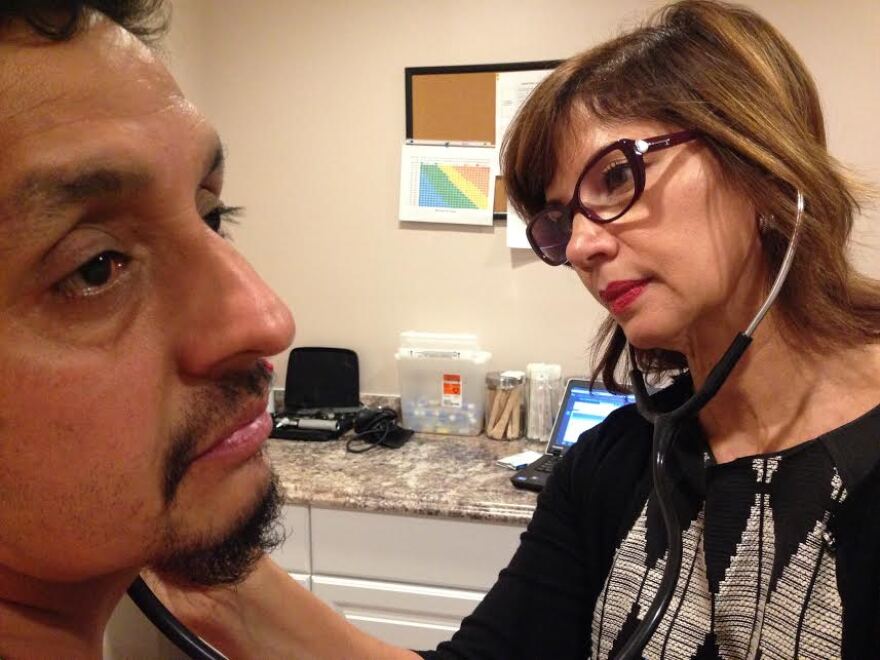This is the Affordable Care Act’s third open enrollment season and Obama Administration officials expect at least one million more people will enroll by the end of next year.
The increase in the country’s insured population has resulted in major growth in one profession in particular – the physician assistant. This year, Duke University is celebrating the 50th anniversary of its , the oldest in the country.
There was a big demand for doctors in the 1940s and 50s. In fact, in 1959, the U.S. Surgeon General declared a national shortage of medical personnel. The American Academy of Physician Assistants tells the rest of the story in a video:
“By the 1960s, a solution comes marching home. Highly skilled medics and corpsmen returning from war, looking for work.”
Dr. Harvey Estes is a retired Professor and Chair of the Department of Community and Family Medicine at Duke University.
“The Physician Assistant program had been bubbling up in the background probably for some eight or ten years before it actually came to us," Estes said.
Estes is now 90-years-old. He oversaw the Physician Assistant Program, also known as the P.A. Program. And he remembers in 1965 when four students, all former Navy Corpsmen, made up the first P.A. class at Duke for this fast-track medical training.
“They were known to us, finding that they had a solution to their problem, and it was also a solution to our problem, was sort of a natural evolution," Estes said.
Estes said others followed them into the program. Then he said a licensed practical nurse at Duke began to pester her supervisors for a shot at becoming a physician assistant. In 1970, became the., and the first African American woman.
“She eventually through her own efforts pushed her way in. She did very well. She became the prototype," Estes said.
When Nichols graduated, Estes helped her raise money to open one of the first rural clinics in America to be staffed predominately by a Physician Assistant. Nichols' work in North Durham was featured in a 1973 documentary film called https://vimeo.com/78938714">“Whatcha Going To Do – Going Back.”
“How are you doing Miss Ruth? I’m going to check your blood pressure while I’m here to see how you’re doing, okay," Nichols says in the video
Karen Hills is the Program Director of the She walked me along a wall of class photographs of P.A. graduates in their spacious building on Duke Street, near downtown Durham. She point out Nichols. Hills said in 50 years, they have gone from four students in the first class to approximately 90 students per class.
“Where people who are interested in medicine can have a two year investment in their education and can be out, actually practicing medicine, taking care of patients, earning nice income," Hills said.
the number one “Most Promising Job” of 2015. The Affordable Care Act has sparked the need for more primary care generalists.
P.A.s can practice medicine, under the supervision of a physician. They can examine patients, diagnose illnesses and provide treatment, a job that can earn a six-figure salary.
Hills said many people are re-careering into the field.
“So people have been certified nursing assistants, they may be physical therapy aids, they may be physical therapists, they might be nurses, they might be EMT’s, paramedics," Hills said. "Going into our military roots, we have Navy Corpsmen, Special Forces medics."
Many small community health clinics rely on physician assistants to provide the bulk of patient’s care. Leona Doner heads in Zebulon. Doner said she has one physician assistant at her clinic right now and it’s Maria del Valle-Torres.
“She’s an asset as far as I’m concerned." Doner said. " I don’t know what I would do without her.”
Valle-Torres graduated from Duke’s PA Program in 2009. She volunteers her time at Shepherd’s Care, mostly caring for Spanish-speaking patients.
Valle-Torres said being a physician assistant is a second career. She worked for years in scientific research and as a medical translator in South America. Valle-Torres said she decided she needed to become a provider.
“When I started working here, it was quite a wake-up call to realize how many people were out of medical care or never had continuing care or a medical home. And I know you saw our new patient today, she got emotional," Valle-Torres said. " She was emotional because it is a big deal for our patients to be able to call this clinic their medical home.”
Valle-Torres said her P.A. degree has changed her life forever, and hopefully that of her patients. There are close to 200 physician assistant programs across the country and about 75 more under consideration.










